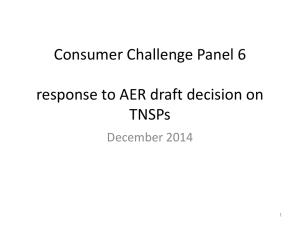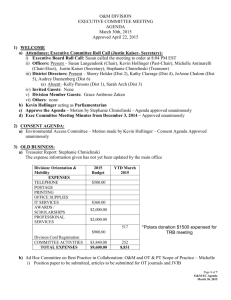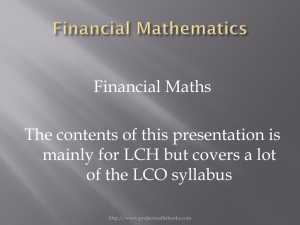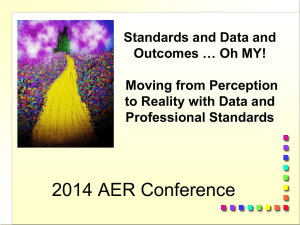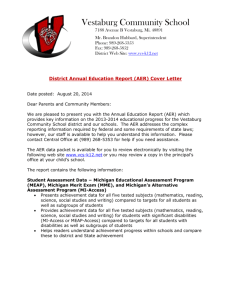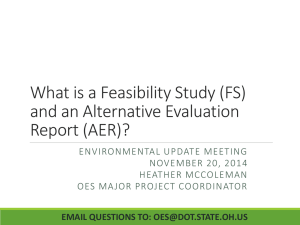Word Version
advertisement
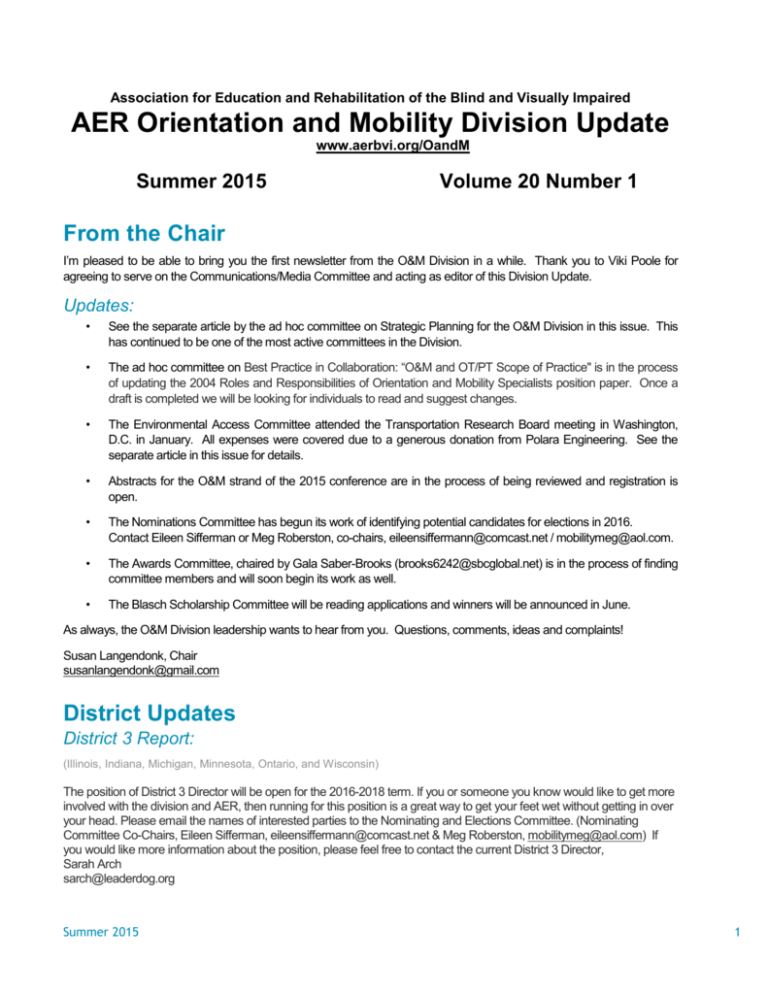
Association for Education and Rehabilitation of the Blind and Visually Impaired AER Orientation and Mobility Division Update www.aerbvi.org/OandM Summer 2015 Volume 20 Number 1 From the Chair I’m pleased to be able to bring you the first newsletter from the O&M Division in a while. Thank you to Viki Poole for agreeing to serve on the Communications/Media Committee and acting as editor of this Division Update. Updates: • See the separate article by the ad hoc committee on Strategic Planning for the O&M Division in this issue. This has continued to be one of the most active committees in the Division. • The ad hoc committee on Best Practice in Collaboration: “O&M and OT/PT Scope of Practice" is in the process of updating the 2004 Roles and Responsibilities of Orientation and Mobility Specialists position paper. Once a draft is completed we will be looking for individuals to read and suggest changes. • The Environmental Access Committee attended the Transportation Research Board meeting in Washington, D.C. in January. All expenses were covered due to a generous donation from Polara Engineering. See the separate article in this issue for details. • Abstracts for the O&M strand of the 2015 conference are in the process of being reviewed and registration is open. • The Nominations Committee has begun its work of identifying potential candidates for elections in 2016. Contact Eileen Sifferman or Meg Roberston, co-chairs, eileensiffermann@comcast.net / mobilitymeg@aol.com. • The Awards Committee, chaired by Gala Saber-Brooks (brooks6242@sbcglobal.net) is in the process of finding committee members and will soon begin its work as well. • The Blasch Scholarship Committee will be reading applications and winners will be announced in June. As always, the O&M Division leadership wants to hear from you. Questions, comments, ideas and complaints! Susan Langendonk, Chair susanlangendonk@gmail.com District Updates District 3 Report: (Illinois, Indiana, Michigan, Minnesota, Ontario, and Wisconsin) The position of District 3 Director will be open for the 2016-2018 term. If you or someone you know would like to get more involved with the division and AER, then running for this position is a great way to get your feet wet without getting in over your head. Please email the names of interested parties to the Nominating and Elections Committee. (Nominating Committee Co-Chairs, Eileen Sifferman, eileensiffermann@comcast.net & Meg Roberston, mobilitymeg@aol.com) If you would like more information about the position, please feel free to contact the current District 3 Director, Sarah Arch sarch@leaderdog.org Summer 2015 1 District 4 Report: (Connecticut, Massachusetts, Maine, New Brunswick, Newfoundland, New Hampshire, New York, Nova Scotia, Prince Edward Island, Quebec, Rhode Island, Vermont) As a newly elected Director for District 4, I am still trying to find my way in this position. I was delighted to be able to attend the NY-AER conference (fall, 2014) and meet many of my constituents there; fall 2015 I plan to attend the NEAER conference to meet/re-meet my fellow New England constituents. At the NEAER conference we will be presenting a session that has been making the circuit at many AER conferences, whereby the O&M board is seeking feedback on where folks see/want to see the profession & the division in the upcoming years. This promises to be a fabulous forum to have some awesome dialogue about our beloved profession...please plan to join us!! I would love to hear from you/chat with you regarding this awesome profession and our unique region of AER...I'm here to serve you NY & NEAER! Kathy Clarrage Katherine.c.clarrage@maine.gov District 6 Report (Delaware, D.C., Maryland, New Jersey, Ohio, Pennsylvania, Virginia, Virgin Islands, West Virginia) After five years as District Director (DD) 6 for the O&M Division, my term expires in 2016 due to term limitations. (Maybe our national, state, and local politicians could learn from our O&M Division?) Being a DD has enabled me to talk with/meet colleagues nationwide and be a part of a creative, professional, and dedicated group of individuals. Our O&M Division is strong because of its leadership. I encourage anyone with an interest in spending time out of their comfort zone, networking with colleagues in their region and elsewhere, promoting the O&M field and being an integral part of the O&M Division, to please apply for the DD position. KSA’s needed: 1) current membership in AER and in the O&M Division; 2) computer skills & a pleasant phone voice (!); 3) the ability and time to follow through on tasks you commit to undertaking; and 4) an enthusiasm for our profession. Travel expenses to the Virgin Islands are not covered. Audrey Dannenberg, COMS, CVRT audrey.dannenberg@gmail.com Environmental Access Committee Report by Janet Barlow, Chair, jmbarlow@accessforblind.org EAC members have continued to try to provide updated information in their various regions, particularly fielding a number of questions about how to request and advocate for accessible pedestrian signals (APS), and questions on proper installation of APS and detectable warnings. A recent concern for committee members is how to get Orientation & Mobility Specialists in the field to teach accurate and up-to-date information about actuated traffic signals and the appropriate use of pedestrian pushbuttons. Our main activity last quarter, though, was attendance at the meeting of the National Committee on Uniform Traffic Control Devices (Beezy Bentzen) and at the Annual meeting of the Transportation Research Board (Janet Barlow, Beezy Bentzen, Lukas Franck, Meg Robertson, Dona Sauerburger). These are meetings of traffic engineers and transportation planners, many of whom have never heard of Orientation & Mobility Specialists. Our goal is to continue to raise awareness of issues affecting travelers who are blind or who have low vision and to encourage designs and practices that improve access and safety. Summer 2015 2 National Committee on Uniform Traffic Control Devices Arlington, VA, January 7-9, 2015 The National Committee on Uniform Traffic Control Devices (NCUTCD) is a group representing various organizations interested in traffic control that makes recommendations to the U.S. Federal Highway Administration for changes to information in the Manual on Uniform Traffic Control Devices (MUTCD). The NCUTCD meets twice each year, in January and June. Breezy Bentsen is an individual member of Signals Technical Committee of the NCUTCD and helps develop proposed language about traffic signals. When Signals Technical approves new or revised language, it is sent out to the NCUTCD sponsoring organizations for comments. Comments are acted upon by Signals at the next meeting, and then changes are considered by the full Council. If approved, the revised language is sent to the Federal Highway Administration’s MUTCD team to be considered for inclusion in the next edition of the MUTCD. At this point, the next revision is expected to be published in 2016. Janet Barlow is an actively participating non-member, as is Lukas Franck. Because they are not members of specific technical committees, they are free to participate in any committee that is actively considering an issue that affects travelers with visual impairments. Neither Janet nor Lukas was able to attend this past January, however. During that meeting in his “goodbye” speech, a retiring member stated that his work with us and with individuals who are blind to add language on APS was one of the two things he was most proud of in his 40 years on the Committee. Issues that were being worked on this year included making sure that priority signal strategies for transit vehicles couldn’t shorten the time for pedestrians to complete their crossings (pedestrian clearance times). We are also working toward a requirement that there be an audible information device where there are pushbuttons to actuate flashing yellow beacons. The audible information device may be a lot like an APS. It should have a pushbutton locator tone, so a person who is blind will know it is there, and speech message that says “Yellow lights are flashing” when the button is pushed and the yellow lights begin flashing. The MUTCD has permitted passive pedestrian detection to be used to actuate pedestrian signals, including APS, since 2000. (In passive detection, the pedestrian is detected by a technology such as microwave or video, and pedestrians don’t have to push a button to get a walk signal.) Now it is possible to actuate the APS pushbutton locator tone using passive detection, and some people think this may be a good way to reduce the noise of locator tones. We are working to make sure that if locator tones are actuated by passive detection, they are required to come on and be audible to approaching pedestrians when the pedestrians are no less than six feet from the relevant pushbutton. It is quite complex to make passive detection and APS work well together, so we are also proposing research on whether this has any unintended adverse consequences for visually impaired travelers. Transportation Research Board (TRB) Washington, DC, January 11-15, 2015 The Transportation Research Board (TRB) Annual meeting is held in Washington, DC each January and attended by more than 11,000 people, mainly traffic engineers, transportation planners and researchers from all over the world. There are hundreds of presentations and workshops on issues ranging from asphalt (we don’t go to those) to traffic signals to transit scheduling. Janet Barlow led a workshop this year titled “Look right! Look left! Where? Accommodating Pedestrians at Alternative Intersections” with active participation from participants in developing a list of research needs related to pedestrians and some new types of intersection designs. In addition to presentations, more than 200 TRB committees meet during the Annual Meeting. The task of those committees is to: • “identify research needs; • provide information to the transportation community on research priorities and procedures; • review papers for presentation at the TRB Annual Meeting and for publication; • encourage the incorporation of appropriate research findings into practice; and • develop special programs, conferences, and workshops”. A short list of committees attended this year by EAC members include: Pedestrians, Geometric Design, Accessible Transportation and Mobility, Work Zone Traffic Control, Traffic Control Devices, User Information Systems, Traffic Signal Systems, Safe Mobility of Older Persons, Roundabouts, Visibility, and the Intersections Joint subcommittee. Summer 2015 3 By participating in committees, we help shape the research agenda in each area, and advocate for and help arrange for workshops and sessions related to transportation factors affecting pedestrians with visual impairments. Anyone can attend and speak up at any committee meeting although it can be daunting at times and their agendas are quite packed. Members of the EAC are members of a few committees (Pedestrians, Roundabouts, Accessible Transportation and Mobility), and are very active participants in others. A few particular examples of our participation: • Dona Sauerburger told the Older Persons’ Mobility Committee about AER's Conference on Vision Loss in Older Adults & Veterans (in Norfolk November 4-6), and several people came up afterwards to find out more about it. • After a presentation of the Older Persons and Mobility committee, Meg Robertson recommended that they put together suggestions to help people know when they need to stop driving • Janet Barlow shared information from the workshop on Alternative Intersections at the Pedestrians Committee and at the Intersections Joint subcommittee and is on a workgroup to develop a research problem statement regarding needs of pedestrians, and particularly visually impaired pedestrians, at alternative intersections. • Beezy Bentzen worked with two transit committees to get assistance and support for research proposals on guidance surfaces and wayfinding in transit stations. • Ongoing research on accessibility of roundabouts and channelized turn lanes was discussed at the Roundabout Committee meeting and Lukas Franck talked with a FHWA representative about researching and standardizing sound making materials on roadways. First time observations from Meg: “Thanks to the O&M Division & EAC committee, I was able to attend my first Transportation Research Board meeting this past January. We were in meetings from 7am to sometimes 9:30 at night! The one take away, I'm sorry to say, is the lack of understanding these professionals have regarding how an individual's access to the community is impacted by vision loss. Even in the sessions which focused on the needs of older individuals, there was very little awareness or discussion of these sensory issues. There is a great need for our profession to attend these meetings and speak up at them so the environments being designed won't negatively affect our consumers.” There are a number of reasons why participation of O&Mers in these meetings is valuable to the orientation and mobility profession and to people who are visually impaired. We are able to: 1) remind attendees that there are visually impaired individuals traveling on the streets they design; 2) suggest research on issues of importance or add questions that may address needs of people who are blind or visually impaired; 3) call attention to the relevance of the topics for people with visual impairments; 4) increase visibility of our profession among those who are designing and operating sidewalks, intersections and transit systems; and 5) take advantage of opportunities for individual follow-up from traffic engineers or planners who heard us introduce ourselves at committee meetings and want more information for a specific project in development in their city. We have made progress in getting transportation researchers and professionals to realize that what they do has consequences for travelers who are blind or who have low vision; some of this is due to the active and vocal participation of O&M Specialists in TRB activities. We continue to influence the direction of research and the topics addressed at conferences by our participation in TRB. We’d like to again express our appreciation to the AER O&M Division for their support of our registration costs for TRB, Lois Thibault and Jacques Peters for providing a place for some of us to stay, and to Polara Engineering for assistance with transportation and other expenses at both meetings. Taking Initiative: AER O&M Division Works on Strategic Plan In August 2014, O&M Division Chair Susan Langendonk appointed the Ad Hoc Committee for Strategic Planning, Goals and Initiatives within the AER Orientation & Mobility (O&M) Division, charging the committee to: 1. 2. 3. 4. 5. Engage constituents in brainstorming for the development of a strategic plan and potential division initiatives, Identify real and perceived strengths and weaknesses of the division's leadership, activities and initiatives, Conduct a member/constituent survey for strategic planning, Formulate short- and long-term division goals and initiatives with estimated dates for accomplishment, Report to the division membership at the AER International O&M Conference 2017 in Pittsburgh, Pa. Summer 2015 4 The committee is comprised of the following individuals: Susan Langendonk, O&M Division chair; Michelle Antinarelli, O&M Division chair-elect; Sarah Bussey; Lukas Franck; Kevin Hollinger, O&M Division past-chair; Dr. Richard Long; and Beth Sutton. To inform stakeholders about the strategic planning effort and to begin soliciting their input. Committee members and select division members have moderated roundtable discussions at many conferences, including those held by NCOMA, SOMA and CAOMS, as well as distributed questionnaires at the conferences of SWOMA and AER Missouri chapter. The committee is actively researching and submitting abstracts to present at multiple conferences in 2015, the AER Conference on Vision Loss in Older Adults & Veterans, and various AER chapter conferences (Penn-Del, Michigan and Northeast). The session outcomes largely mirror the committee’s charge—i.e., to engage constituents and members in brainstorming for the strategic plan and division initiatives and to identify the division’s strengths and weaknesses—with the added goal of recruiting volunteers to serve in the division. To allow committee members to connect with division members, non-members and interested constituents, learning how the division can improve communication and serve O&M specialists (OMS) and guide dog mobility instructors (GDMIs). Engaging as many OMS and GDMIs as possible will help identify common concerns about the field’s future and ideas to strengthen the profession while gaining information and integrating ideals into the strategic plan. The committee’s goal is to host several information work sessions to conclude the input stage of the project at the AER International Conference 2016 in Jacksonville, Fla., followed by the committee’s finalizing and reporting on the strategic plan and initiatives at the AER International O&M Conference 2017 in Pittsburgh, Pa. Committee history Langendonk appointed the committee following a meeting held at the AER International Conference 2014 in San Antonio, Texas, between several division members and the O&M Summit Group Steering Committee. Meeting participants included then Division Chair Kevin Hollinger, Chair-Elect Susan Langendonk, Past-Chair Marjie Wood, “to be” Chair-Elect Michelle Antinarelli, and Summit Group representatives Dr. Richard Long, Sarah Bussey and Lukas Franck. The O&M Summit Group formed after the AER International O&M Conference 2013 in New Orleans, La. Summit participants discussed the possibility of OMS and GDMIs forming their own professional association, and also if the group could structurally operate within AER and/or the O&M Division, or if it should be a separate organization. The genesis of this discussion was a sense, among a minority of professionals, that the field was “going astray.” Some participants voiced concerns about AER and the O&M Division, citing a desire for stronger leadership on O&M-related issues. The summit met through a series of five conference calls, facilitated by Jeremy Grandstaff of S&G Endeavors. Areas of concern included the quality of personnel preparation programs, recognition of the profession in the broader community, the encroachment of occupational therapists into the field, third party payment, licensure and control of division dues within AER. Despite identifying several areas to improve upon with AER, summit participants decided to work within the O&M Division to achieve their goals rather than establish an independent organization. The 2014 San Antonio meeting between division officers and summit leaders included an enlightening discussion of AER’s financial history (as reported in the summer 2014 issue of AER Report); a review of the division’s financial history; discussion of the summit’s reported conclusions; consideration of the serious, expressed concerns of division members about the future of the field; and the division’s ability to take effective action to support the profession from within AER. The group agreed to begin soliciting input from its members, as well as non-members and other constituents, on the future of the division and profession as a whole. Thus, the Ad Hoc Committee for Strategic Planning, Goals and Initiatives began. Next steps To help disseminate information about the committee’s efforts, the committee is developing an accessible PowerPoint presentation with audio and a survey and will post them on the division’s website. We ask all members, non-members and other constituents to attend and participate in the presentations as well as visit the website in the coming months. A blast email will announce the launch of the PowerPoint and survey. We welcome your feedback and input now and always. Summer 2015 5 With anticipation of great things to come, Ad Hoc Committee for Strategic Planning, Goals and Initiatives Michelle Antinarelli (chair-elect), Sarah Bussey, Lukas Franck, Kevin Hollinger (past-chair), Susan Langendonk (chair), Dr. Richard Long, and Beth Sutton Guests: Dr. Bill Jacobson, Dr. Justin Kaiser, Brenda Naimy, and Chris Tabb California O&M Licensure Webinar Available Online Licensure for vision professionals such as Orientation & Mobility Specialists has been an ongoing discussion topic for several years, and recent conversations on the subject have sparked interest among Californians. AER hosted a 1½ hour webinar on May 10 with the California Association of Orientation and Mobility Specialists, which is available for viewing on the AER Web site at no charge. This webinar covered what licensure is, what it means for O&M and other vision professions, and what’s involved in moving forward. Go to http://aerbvi.org/?page_id=455 and scroll to the bottom of the page to access the free webinar. Meet the Editor Hello, I’m Viki Poole, the new editor of the O&M Division Update. I have over 40 years experience teaching students with vision impairments and blindness. I retired from Memphis (TN) City Schools as an Itinerant Teacher, where I provided O&M as well as low vision services. While I was teaching in Memphis, I was also the Low Vision/O&M Consultant for Tipton County (TN) Schools. I still provide consulting service for Tipton County and now I’ve found a new job at the University of Memphis. The TigerLIFE Program at the University of Memphis is a vocational training program for Intellectually Disabled students 18-29. There are several students with visual impairments enrolled in our program, experiencing success after high school. I’m a lifetime volunteer. My current volunteer jobs are at Shelby Farms Park and the Pink Palace. Shelby Farms Park is the largest urban park (4500 acres in the city!) in the US. I answer phones and visitor questions about activities available in the park. I also volunteer in the Planetarium at the Pink Palace Museum. Construction on the Pink Palace was originally started by Clarence Saunders, founder of Piggly Wiggly grocery stores. He wanted to build it for his wife. He imported pink marble from Italy for the exterior, in addition to many other extravagant things for their new home. Unfortunately, he went broke in the Depression and so donated the unfinished building to the city. The city of Memphis completed the house and still operates the facility as a natural history museum. I have been the editor of newsletters for four of the volunteer organizations I have been involved with over the years. The technology has changed a lot over time, but I believe that content remains the most important aspect of this form of communication to ensure member engagement. I want to continue to help the O&M Division develop a vibrant community - the give and take that is essential for growth to occur. Please feel free to send articles and comments to me at brailletchr@gmail.com. I welcome your help to make this a great way to communicate with each other. Thank You… Michelle Antinarelli resigned her position as Chair-Elect of the O&M Division effective May 21st. We appreciate Michelle's input and understand the difficulty of pairing a leadership position in the O&M Division with a full-time job, college classes and a family. Michelle has offered to continue to be involved with AER and O&M Division activities and her knowledge and energy are most welcome! Justin Kaiser, who was serving as Secretary of the O&M Division has agreed to step into the position of Chair-Elect. Division Executive Committee CHAIR: Susan Langendonk EMAIL: susanlangendonk@gmail.com PAST CHAIR: Kevin Hollinger EMAIL: kevin.hollinger@fhsdschools.org CHAIR ELECT: Justin Kaiser EMAIL: kaiser.tao@gmail.com Summer 2015 6 SECRETARY: vacant TREASURER: Stephanie Chmielinksi EMAIL: stephchm20@gmail.com DISTRICT 1: Vacant (Alaska, Alberta, Arizona, British Columbia, Colorado, Hawaii, New Mexico, California, Nevada, Idaho, Montana, Wyoming, Northwest Territories, Oregon, Utah, Washington, Yukon Territories.) DISTRICT 2: Sherry Holder sholder@osb.k12.ok.us (Arkansas, North Dakota, South Dakota, Iowa, Kansas, Louisiana, Manitoba, Missouri, Nebraska, Oklahoma, Saskatchewan, Texas.) DISTRICT 3: Sarah Arch sarch@leaderdog.org (Illinois, Indiana, Michigan, Minnesota, Ontario and Wisconsin.) DISTRICT 4: Kathy Clarrage kcclarrage@gmail.com (Connecticut, Massachusetts, Maine, New Brunswick, Newfoundland, New Hampshire, New York, Nova Scotia, Prince Edward Island, Quebec, Rhode Island, Vermont) DISTRICT 5: JoAnne Chalom jchalom@infocusmobility.com (Alabama, Florida, Georgia, Kentucky, Mississippi, North Carolina, South Carolina, Puerto Rico, Tennessee) DISTRICT 6: Audrey Dannenberg audrey.dannenberg@gmail.com (Delaware, Maryland, New Jersey, Ohio, Pennsylvania, Virgin Islands, Virginia, West Virginia, Washington D.C.) Visit the O&M website for a list of Committees: http://oandm.aerbvi.org/committees.htm Association for Education and Rehabilitation of the Blind and Visually Impaired 1703 N. Beauregard St., Suite 440 ■ Alexandria, VA 22311-1744 aer@aerbvi.org ■ www.aerbvi.org ■ http://oandm.aerbvi.org Summer 2015 7
